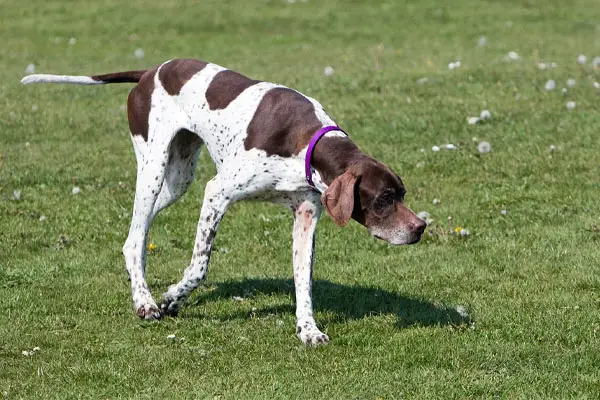As their name implies, pointers were bred to point birds and small game animals such as rabbits. The Pointer dog stands at the height of 23-28 inches and is easily recognizable with its long head and pointed tail. They feature a short, smooth coat that comes in several colors.
Pointers are great dogs for hunters, but they make excellent family companions too. With their high energy, they need to stay active, which means lots of exercise every day. This might be overwhelming for first-time dog owners.
For those who are up for that challenge, know that Pointers will not only be your pet. Pointers are also true and loyal friends.

Pointer Breed Statistics
| Dog Breed Group | Sporting |
| Breed Size | Medium |
| Height | 25-28 inches (male); 23-26 inches (female) |
| Weight | 55-75 pounds (male); 45-65 pounds (female) |
| Lifespan | 12-17 years |
Pointer Ratings
| Energy level | |
| Exercise needs | |
| Requires attention | |
| Playfulness | |
| Trainability | |
| Shedding | |
| Grooming | |
| Friendly with family | |
| Friendly with kids | |
| Friendly with strangers | |
| Friendly with other dogs | |
| Prey Drive |
Pointer History
Pointers were developed around the 1600s in Europe. Their name says it all! These dogs were created to locate and point hare, which were ten chased by greyhounds.
The name pointer was derived from the usual pose the dogs do when they catch the scent of the game (birds or rabbits):
Heads are lowered with their nose pointed towards the direction where the game is. Their tails are held in a horizontal direction. And one of their legs is raised with the wrist bent as if pointing.
Hunters follow the direction these dogs are pointing at to catch the game. Because of this, Pointers became known for their impressive skill of pointing and tracking that they have become preferred dogs of hunters by the next century.
It’s unknown how the Pointers reached the US, but there are theories that early colonists brought them. The earliest record of the breed in the US was Sensation, a Pointer imported from England in 1876.
Sensation became the emblem of the Westminster Kennel Club by 1877. Two years later, the American Kennel Club recognized the dog breed. Now, Pointers rank 114th as the most popular dog in the US.
Pointer Temperament
Pointers are generally loyal, hardworking, and even-tempered dogs. Their temperaments can range from being competitive and independent to being fun-loving and mischievous. They are also very protective of family and property, which makes them excellent watchdogs.
True to their hunting origins, Pointers are known to be very active dogs. They work well with people, but their high-energies make them best paired with active owners who can give them enough exercise until they’re satisfied.
Pointers may become restless when bored. It’s also not recommended to confine them or leave them alone for long periods. This may bring out destructive behavior, which is usually through chewing or barking.
You may know by now that Pointers are not suitable for apartment or city living because of their high exercise requirements. They are also known to be gentle dogs for children, work well with other pets, and friendly with strangers.
Socialization is vital to make them more well-rounded dogs. They can also be a bit stubborn and sensitive, which may make training a little bit challenging.
You would need lots of patience and make sure to prepare rewards and praise. Don’t be harsh on them, and make sure to provide firm and consistent leadership.

Pointer Care Requirements
- Nutrition: Feeding a Pointer is not that complicated. All they require is a high-quality and well-balanced meal to stay healthy. There are also no special dietary requirements needed. Make sure that your dog’s meal consists of all the essential nutrients – proteins, fats, carbohydrates, vitamins, and minerals. You should only buy high-quality ingredients, too. You can get proteins from animal meat, fats from fish oils, carbohydrates from whole grains, and vitamins from fruits and vegetables. Fruits and vegetables are also excellent sources of fiber. This will aid your dog’s digestion, too. Take note of any allergies your dog may have and stay away from those.
- Grooming: Pointers have short, smooth coats that shed occasionally. The coats require very minimal maintenance, which includes weekly brushing to remove dirt and loose hair. Baths can occasionally be given too, but you need to regularly clean their ears to avoid infection. Nails should be trimmed often and maintained short. Long nails can cause pain and discomfort, which is something you don’t want for your dog.
- Exercise: Pointers are very active and energetic dogs. They require lots of exercise every day if you want them to be healthy and happy. If you’re a hunter, then they are perfect hunting partners. However, long walks or daily play sessions are also an excellent exercise for the breed. They are happier if they spend time with their owners. Make sure to keep these dogs on-leash when taking them on a walk. If you allow them to run around, it’s best to be in an enclosed yard. You can also make them participate in dog sports where they can showcase their skills.
- Health: Pointers are generally healthy dogs. However, they are prone to several health issues. Although it’s possible they may not suffer from these conditions throughout their lifetime, it’s still best to be aware of them. Bone diseases are very common with these dogs. Examples of bone diseases they may acquire are hip dysplasia and neurotropic osteopathy. Eye diseases such as progressive retinal atrophy, cherry eye, entropion, and cataracts. Pointers may also acquire hereditary diseases or congenital disabilities like chondrodysplasia, Addison’s disease, and demodectic mange. Epilepsy, allergies, and skin cysts are something to watch out for too. You can get your dog to take a screening test if you want to detect certain diseases early. It’s also recommended to meet at least one of your dog’s parents to be aware of any hereditary illness your dog may acquire.
- Lifespan: The life expectancy of Pointers is 12-17 years.

Famous Pointers
Sensation: The first Pointer recorded that was imported from England; the emblem of Westminster Kennel Club
Fun Facts About Pointers
- Pointers originated from Europe in the 1600s.
- These dogs are believed to have originated from the Spanish Pointers.
- They are hunting dogs, mainly used for pointing birds and small game during hunting.
- Pointers are named after the stance they create during the hunt.
- They are the oldest sporting dog breed.
- They are also known as the “Cadillac of Bird Dogs.”
- Pointers were one of the very first dog breeds registered in America; they were recognized in 1879.
Check Out Other Sporting Dog Breeds:
American Water Spaniel, Boykin Spaniel, Brittany, Chesapeake Bay Retriever, Clumber Spaniel, Cocker Spaniel, Curly-Coated Retriever, English Cocker Spaniel, English Setter, English Springer Spaniel, Field Spaniel, Flat-Coated Retriever, German Shorthaired Pointer, German Wirehaired Pointer, Golden Retriever, Gordon Setter, Irish Red and White Setter, Irish Setter, Irish Water Spaniel, Kooikerhondje, Labrador Retriever, Lagotti Romagnoli, Nova Scotia Duck Tolling Retriever, Spinoni Italiani, Sussex Spaniel, Vizsla, Weimaraner, Welsh Springer Spaniel, Wirehaired Pointing Griffon, Wirehaired Vizslas
